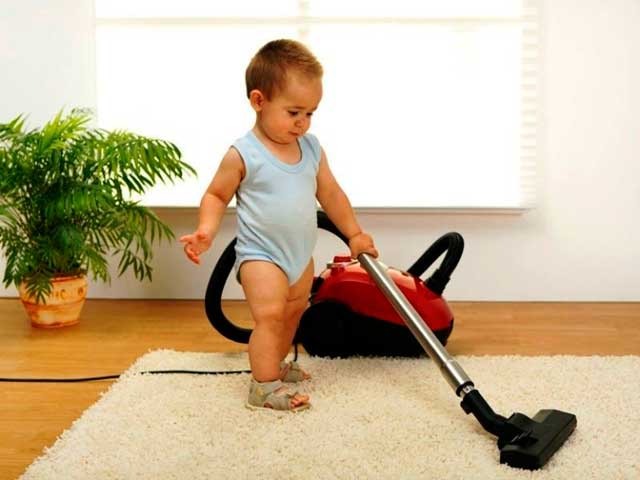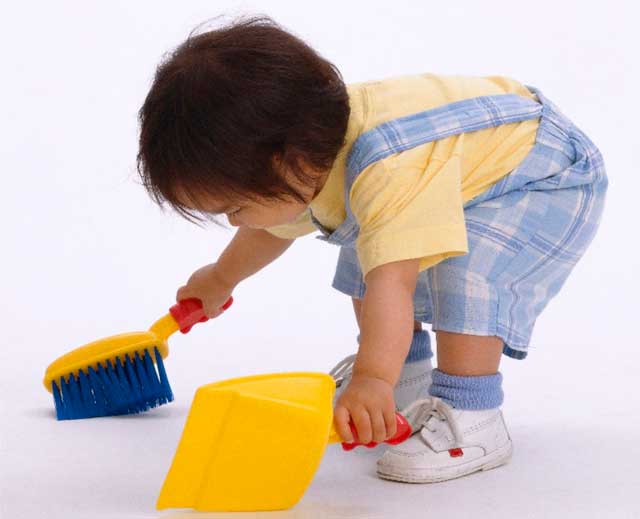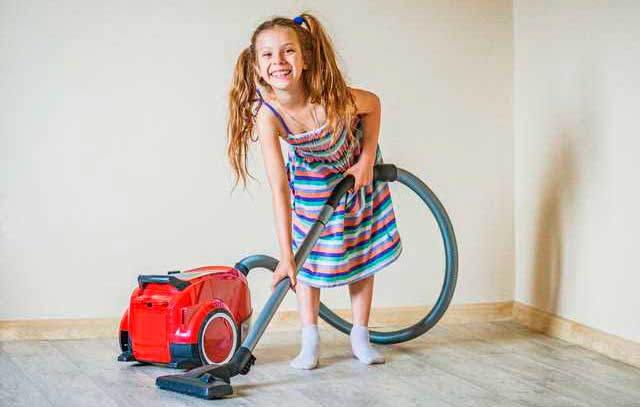To ignore the child’s request to collect toys, you can hear the words:
- Well lazy! All to dad ... Yes, genes can not be crushed with a finger.
Parents often blame failures in raising a child on the character of the baby and blame the "low-quality" genes. What are these genes and why are they to blame? Or maybe the thing is different?
The child is not an adult! Due to the imperfect psyche and undeveloped willpower, children require a special approach. By cunning and small tricks, you can achieve a greater result than orders, reproaches and punishments. So, how to teach a child to order in the house.

8 commandments for parents
No tricks and methods will help to teach a little slut to order if adults do not follow the following rules.
- Required: Set a personal example. Young children love to imitate adults. Parents have a pattern of behavior for them. It is impossible to teach a child to clean up things if mom and dad themselves do not maintain order. To instill a habit in the baby, it must first be raised in the parents.
- Be consistent. Do not indulge. Having pity on the child, and letting him not clean one after another, he will understand that he can persuade his mother. And such persuasion agreements will become the norm: “Can I later?”, “Let's clean it later.”
- Do not forget to praise. Praise is a powerful incentive. It’s quite difficult to instill a habit without it. Sometimes you just have to thank the baby so that he has a strong desire to "help."
- Educate regularly. You can’t fix a habit by doing this from case to case. The child does not understand why yesterday it was possible, and today it is impossible. In other words - do not be lazy! Accustom your baby to order daily.
- Never: Do not force or punish your work. It is not possible to cultivate a habit by violent methods. It is formed on a voluntary basis. Forcing and obliging to clean the house, you will repel any desire of the child to help.
- Do not do for him. The kid should not see that others can clean the room instead. Otherwise, he will understand that he does not have to do it himself. Even when the baby is tired or sick, it is better to postpone the cleaning, but in no case to clean instead.
- Do not yell at the child. No need to make a neurotic out of it. Screams and scandals are unlikely to achieve a positive effect. The child will become afraid and clean you in the room. But as soon as the parents are over the threshold - things will be "laid out" anywhere.
- Do not criticize or scold for failure. The kid tried, he wanted to help ... It happens to everyone ... Support the baby. Say that another time is sure to work out. He must not be disappointed. Otherwise, the next time in every way he will refuse to help.
We accustom to order

Most often, parents are disturbed by a mess in the baby's room. Just put things in order, after 30 minutes it was gone. But the mess does not end there. After conquering the nursery, insolent toys begin to occupy other rooms. Say “STOP!” lawlessness, or ...
Tricky ways for a little lazy person
Toys, time to go home
Build houses for toys and children's items. It is desirable that the homes are bright and colorful. It will be much more interesting for the kid to send toys home than to bring “serious” order in the room.
Cars can make a cardboard garage. Tape it with colored paper, cut out the gate and come up with a sign. Dolls are conveniently cleaned in a wardrobe, where shelves are cribs. Sew doll pillows and blankets there. Outside, the cabinet doors also need to be transformed: draw a window and a roof, clouds, the sun.
Small items are practical to store in boxes of houses. Paste them with colored paper, mark the windows and make a triangular roof out of cardboard.
We also read: how to store LEGO
Let's play
- Option 1. "Who is faster?". Not one child will refuse such entertainment. Offer your kid a competition. On command, an adult and a child collect scattered toys into boxes. Whoever collects faster - he won.
- Option 2 "Spread it right!". The meaning of the game is to sort objects according to one attribute. For example, soft toys in one box, hard toys in the other, large ones, wooden - metal, red - blue, etc.

Fairytale cleaning
To clean up the room will help characters from fairy tales. Invite your child to transform into a fairytale hero. The girl, putting on her wings, turns into a fairy of order or a sorceress in the children's room. The boy can become a robot cleaner or with the help of toys (a rocket-policeman, a truck-assistant) to transport objects in places. Playfully, the baby will be happy to clean up the nursery and restore order in the mother’s bedroom, in the living room and other rooms.
Train. Adult - dispatcher
He coordinates the actions of the baby. The child depicts a train that travels around the room and listens carefully to what the dispatcher will say. To the words "Station of robots" (dolls, trucks, cubes), the baby collects these items and takes them to places. Thus cleans the entire room.
General cleaning announced!
If you are going to bring a cardinal order to the apartment, do not forget about the baby. All residents take part! Solemnly announce the start of the event. Spread the workload and play energetic music. Even more interesting, if for each cleaning the participants will accumulate points, and then exchange them for a prize. Preliminarily agree on how many points you need to collect.
History of toys
Having once again found scattered toys, hide your favorite ones. After some time, the child will notice the loss. Tell the kid a story about a fabulous country where there are toys that were offended, forgotten, not cleaned in houses. Now his favorites went there to look for a new home. You can write them a letter, ask them to return. However, it is necessary to promise, henceforth, to put them in their place.
We bring up the assistant
- Little "Help". Encourage the baby to any work feasible for him daily. When going to the store, grab a bag for the child. Will help carry the shopping. Ask to bring a bag, wash a cup, a toy. Dampen a cloth; wipe dust off accessible areas. Vacuum the carpet together. Thank the little assistant, and in no case redo the work of the child in his presence. Otherwise, he will think that his mother did not like it, will be disappointed and will not help in the future;
- A little duty. Create a small but constant task for the crumbs.For example, change the drinker to a parrot, feed the hamster or make sure that there is no dust in certain places. Depending on age, he can hang small things after washing, lay out products that have arrived from the store or washed spoons and pans into place. Duty brings up responsibility in children and makes them feel necessary and useful;
- Ritual. A great way to keep your room tidy is to introduce custom. For example, before you go for a walk, lunch or go to bed - the baby needs to clean up the room. First ritual support parents and child. Over time, adult assistance is reduced, and the cleaning ceremony is entirely passed on to the youngest member of the family. He gets used to it and after some time tidies up on his own, he just needs to be reminded that soon he will go for a walk or lunch is ready.
Video - how to teach a child to order: 10 steps
Parents note
- Teach from an early age. The smaller the child, the easier it is to consolidate the habit. The kid gets used to clean up after himself. The order in the room for him is becoming the norm. This will protect you from unnecessary things in the future: “I don’t want”, “tired”, “later”;
- On the positive. Turning to the child, include bright positive emotions. Children become infected with a good mood, and then it is easier to agree with them. Work will go faster, more fun and more interesting;
- Choose the right time. Making mess in a room is much easier than eliminating it. A tired, sleepy child is not an assistant. Find time to clean before the baby is tired or wants to sleep;
- Maintain your baby’s interest. In other words, do not repel the aspirations of a young assistant from an early age. How often can you hear: “Do not touch! You are still small! ”,“ Put in place. I’ll clean it myself! ” It is with these words that the child’s desire to help begins to fade. Let him be small, clumsy, no matter what spills ... Help him, support, but do not forbid!
- Accustom yourself gradually. Attracting crumbs to cleaning, do not overdo it. Children should not be overworked. While the child is small, parents help him. The older the child, the less adult participation;
- Do not demand or expect perfect cleaning. It is impossible to immediately learn how to quickly and accurately clean. To hone their skills, a child needs time and practice. At first, it’s enough that the baby will simply put things in their places. Gradually learn to fold neatly, arrange beautifully;
- Do not accustom to reward. Otherwise, in the future, even for a little work, they will demand a fee from you. Sweetie or cartoon as an encouragement may be in exceptional cases. The reward for restoring order in the room should be praise.
Toddlers like to copy and help adults. You just need to notice their aspirations in time and maintain interest.
We also read:
- 9 simple tips on how to teach your child home help
- 40 basic things a child should be able to do at home from the age of 2 to 13
- Why should a child help with household chores
- My two year old is the best au pair
- How to raise responsibility in a child
- What to do if the child is lazy - how to deal with children's laziness
Video: How to teach a child homework
Psychologist Dmitry Karpachev
How to teach a child to clean toys? I want to say right away that you will not like my answer. I will explain it, justified, why it should be so









Yes, it’s very difficult to teach a child to do what he doesn’t like, or what needs to be done. An adult doesn’t always want to get out, and then baby. We have worked the game method and rewards. It is cleaned with pleasure.
Honestly, the sixth rule confused me greatly with its excessive severity. The child is sick, and the mother walks and does not clean the room, does not wipe the dust, does not do wet cleaning ... is waiting for the child to recover?
In my opinion, this is wrong both from the point of view of pedagogy and from the point of view of home hygiene.
Initially, she did not force the child to do spring cleaning, or even wet, with me. My only request was to put the toys in place. This son rarely refused, if he began to act up, had to turn it into a game. I always waited for him to show interest in cleaning himself and offer his help. And this happened, every time I praise and thank my son for his help. In no case will I forcibly force them to clean, otherwise from an early age I will repulse his desire for this. And I think that really a child needs to be taught something by his own example and wait for him to want to help you. It is only necessary to “reward” the child with his personal responsibilities and ensure that he regularly performs them. Be it folding toys or clothes on shelves.